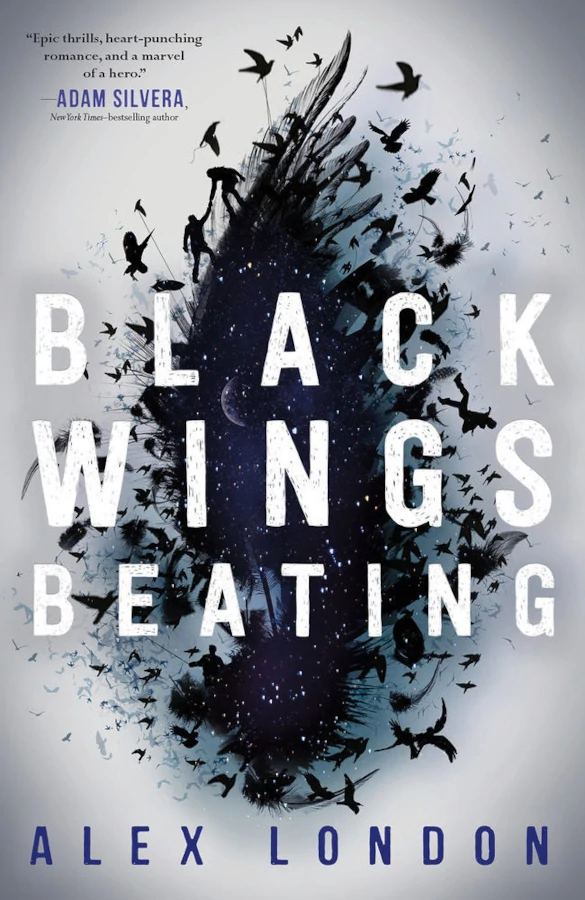
Alex London’s Black Wings Beating
Words By Celia Daniels
Young adult novels require a spark of creativity to stand out in an ever-expanding market. Alex London’s novel, Black Wings Beating, has just that; it reaches out for originality and grabs it. Though the novel’s central coming-of-age story is familiar, twins Brysen and Kylee embark on their journey in a fantastic world full of political drama, religious strangeness, and culture that flies on the wings of falcons.
London invites his readers into Six Villages, a community at the center of his world’s bustling falcon trade. Birds of prey are not only economic bartering chips; they are status symbols as well as religious figures. It’s within this culture that Brysen and Kylee must collaborate in order to pay off debts left to them by people both loved and not—debts that can only be paid by capturing the mythical ghost eagle. This eagle dwarfs other birds of prey and has the ability to see into the hearts of those who would clip its wings and turn their secret hates into powerful weapons. Brysen, in love and desperate to prove himself, sets out to capture this eagle first, but his only hope of achieving the task lies with his sister. Kylee has no desire to work in falconry, but she has been fate-touched—gifted with the ability to speak the Hollow Tongue, making her one of the only people in Six Villages who can save Brysen’s lover, not to mention Brysen himself. Kylee’s ability, though, is much coveted, not only by some of the wealthier residents of Six Villages but also by the leader of the Kartami, a religious organization razing the land in order to “free” communities like Six Villages from their infatuation with raptors and flight.
For a young adult novel, Black Wings Beating manages to avoid a number of potential clichés. It is a coming-of-age story, yes, but the quest which Brysen and Kylee have to undertake does not establish one as more important than the other—even though Kylee is painted as the more logical of the two as well as the most gifted when it comes to falconry. Further, there isn’t a single mentor figure in the novel who isn’t subverted in some way. In fact, Brysen and Kylee both come to have unstable and mistrusting relationships with those people who would require them to sacrifice their relationship with one another in order to improve themselves individually. This loyalty to family does not come at the expense of a realistic sibling relationship, either. Brysen and Kylee snipe at one another throughout the novel, with Brysen always trying to prove himself and Kylee feeling as though she must constantly clean up the messes he leaves behind.
The novel ends in a surprising manner that I won’t spoil here, but it’s clear that, in establishing his Skybound series, Alex London intends to challenge his readers’ understanding of the traditional “journey” story line. That isn’t to say that Black Wings Beating is free of the standard quest narrative trademarks—initial conflict, compromise, and the Odyssian struggle with pride all appear in some manner. The political implications of the twins’ quest, though, draw the reader away from the traditionally singular focus of quest stories. It’s clear from the start of the novel that Brysen and Kylee’s actions have consequences that impact not only Six Villages but the whole of the world in which they live—and who they aid may vary, as intentions remain muddled and political alliances are ever-shifting. It will be interesting to see how London continues to unravel his readers’ expectations. On a less rhetorical note, it is also a delight that London early on establishes not only the dark skin of his protagonists, but also Brysen’s acceptable interest in the other boys of Six Village.
It is a wonder, though, that a book with such deep political undertones is styled as a young adult novel. This is not to say that the book’s audience wouldn’t be able to keep up with the switching sides, but it does make me wonder how London intends to develop his antagonists, protagonists, and everyone in between. How will the Skybound series elaborate on this gray morality and on the impact of war on those individuals who aren’t fate touched? Will this complexity fall short and evolve for mere shock value? Or will London be able to balance the development of his main characters with the ongoing evolution of the world he’s built? Black Wings Beating does a fine job of showing its readers that “bad guys” aren’t always incapable of empathy and that “good guys” aren’t always as morally upright as one might think. I look forward to seeing how this trend continues in the series’ upcoming additions. For the moment, though, Black Wings Beating stands as a fun and subtly complex read that will challenge its readers as much as it entertains them.